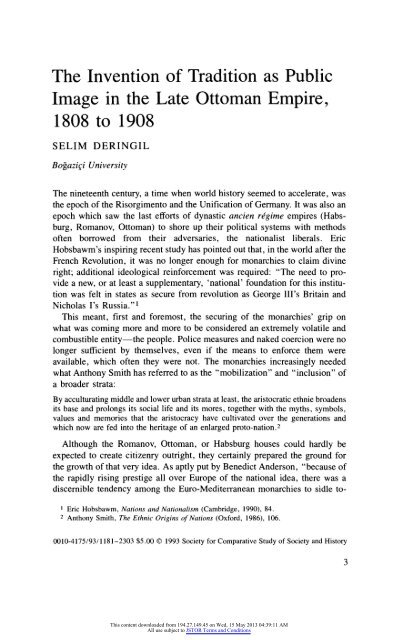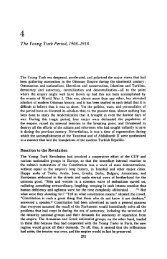The Invention of Tradition as Public Image in the Late ... - PSI424
The Invention of Tradition as Public Image in the Late ... - PSI424
The Invention of Tradition as Public Image in the Late ... - PSI424
Create successful ePaper yourself
Turn your PDF publications into a flip-book with our unique Google optimized e-Paper software.
<strong>The</strong> <strong>Invention</strong> <strong>of</strong> <strong>Tradition</strong> <strong>as</strong> <strong>Public</strong><br />
<strong>Image</strong> <strong>in</strong> <strong>the</strong> <strong>Late</strong> Ottoman Empire,<br />
1808 to 1908<br />
SELIM<br />
DERINGIL<br />
Bogazifi University<br />
<strong>The</strong> n<strong>in</strong>eteenth century, a time when world history seemed to accelerate, w<strong>as</strong><br />
<strong>the</strong> epoch <strong>of</strong> <strong>the</strong> Risorgimento and <strong>the</strong> Unification <strong>of</strong> Germany. It w<strong>as</strong> also an<br />
epoch which saw <strong>the</strong> l<strong>as</strong>t efforts <strong>of</strong> dyn<strong>as</strong>tic ancien regime empires (Habsburg,<br />
Romanov, Ottoman) to shore up <strong>the</strong>ir political systems with methods<br />
<strong>of</strong>ten borrowed from <strong>the</strong>ir adversaries, <strong>the</strong> nationalist liberals. Eric<br />
Hobsbawm's <strong>in</strong>spir<strong>in</strong>g recent study h<strong>as</strong> po<strong>in</strong>ted out that, <strong>in</strong> <strong>the</strong> world after <strong>the</strong><br />
French Revolution, it w<strong>as</strong> no longer enough for monarchies to claim div<strong>in</strong>e<br />
right; additional ideological re<strong>in</strong>forcement w<strong>as</strong> required: "<strong>The</strong> need to provide<br />
a new, or at le<strong>as</strong>t a supplementary, 'national' foundation for this <strong>in</strong>stitution<br />
w<strong>as</strong> felt <strong>in</strong> states <strong>as</strong> secure from revolution <strong>as</strong> George III's Brita<strong>in</strong> and<br />
Nichol<strong>as</strong> I's Russia."1<br />
This meant, first and foremost, <strong>the</strong> secur<strong>in</strong>g <strong>of</strong> <strong>the</strong> monarchies' grip on<br />
what w<strong>as</strong> com<strong>in</strong>g more and more to be considered an extremely volatile and<br />
combustible entity-<strong>the</strong> people. Police me<strong>as</strong>ures and naked coercion were no<br />
longer sufficient by <strong>the</strong>mselves, even if <strong>the</strong> means to enforce <strong>the</strong>m were<br />
available, which <strong>of</strong>ten <strong>the</strong>y were not. <strong>The</strong> monarchies <strong>in</strong>cre<strong>as</strong><strong>in</strong>gly needed<br />
what Anthony Smith h<strong>as</strong> referred to <strong>as</strong> <strong>the</strong> "mobilization" and "<strong>in</strong>clusion" <strong>of</strong><br />
a broader strata:<br />
By acculturat<strong>in</strong>g middle and lower urban strat at le<strong>as</strong>t, <strong>the</strong> aristocratic ethnie broadens<br />
its b<strong>as</strong>e and prolongs its social life and its mores, toge<strong>the</strong>r with <strong>the</strong> myths, symbols,<br />
values and memories that <strong>the</strong> aristocracy have cultivated over <strong>the</strong> generations and<br />
which now are fed <strong>in</strong>to <strong>the</strong> heritage <strong>of</strong> an enlarged proto-nation.2<br />
Although <strong>the</strong> Romanov, Ottoman, or Habsburg houses could hardly be<br />
expected to create citizenry outright, <strong>the</strong>y certa<strong>in</strong>ly prepared <strong>the</strong> ground for<br />
<strong>the</strong> growth <strong>of</strong> that very idea. As aptly put by Benedict Anderson, "because <strong>of</strong><br />
<strong>the</strong> rapidly ris<strong>in</strong>g prestige all over Europe <strong>of</strong> <strong>the</strong> national idea, <strong>the</strong>re w<strong>as</strong> a<br />
discernible tendency among <strong>the</strong> Euro-Mediterranean monarchies to sidle to-<br />
1 Eric Hobsbawm, Nations and Nationalism (Cambridge, 1990), 84.<br />
2 Anthony Smith, <strong>The</strong> Ethnic Orig<strong>in</strong>s <strong>of</strong> Nations (Oxford, 1986), 106.<br />
0010-4175/93/1181-2303 $5.00 1993 Society for Comparative Study <strong>of</strong> Society and History<br />
3<br />
This content downloaded from 194.27.149.45 on Wed, 15 May 2013 04:39:11 AM<br />
All use subject to JSTOR Terms and Conditions












